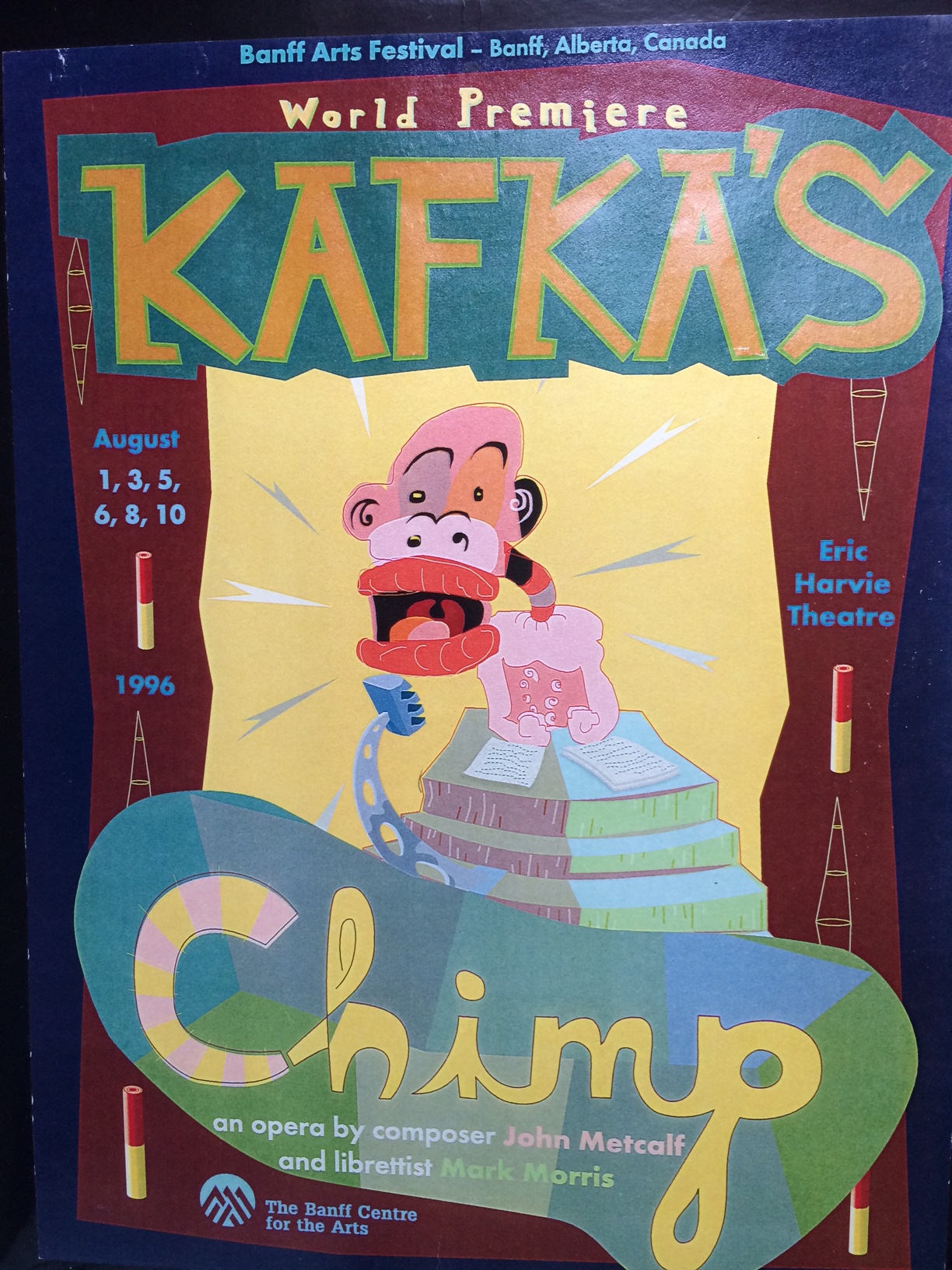Abstract
For those at the centre of its creation, whether as author/composer or as performers, a new opera poses especially difficult challenges of topic, musical style, vocal writing and staging, especially given today’s climate of artistic ferment.
Thus the cheers that erupted at the conclusion of the Banff Centre’s production of Kafka’s Chimp were both a response to the undoubted success of this highly imaginative and brilliantly executed new piece of musical theatre and for audience members concerned with its creation and execution, an acknowledgement that the new opera, so long in gestation, had finally seen the light of day.
The result of nearly 10 years collaborative effort, Kafka’s Chimp is the work of librettist Mark Morris and composer John Metcalf, with a central involvement from stage director Keith Turnbull. Based on Franz Kafka’s short story A Report to the Academy, the opera relates the events of how, through careful education and training, a chimp learns to talk and gradually enters the human world.
Full Text
The opening night of the world premiere of a new opera is inevitably charged with a special frisson.
For those at the centre of its creation, whether as author/composer or as performers, a new opera poses especially difficult challenges of topic, musical style, vocal writing and staging, especially given today’s climate of artistic ferment.
Thus the cheers that erupted at the conclusion of the Banff Centre’s production of Kafka’s Chimp were both a response to the undoubted success of this highly imaginative and brilliantly executed new piece of musical theatre and for audience members concerned with its creation and execution, a n acknowledgement that the new opera, so long in gestation, had finally seen the light of day.
The result of nearly 10 years collaborative effort, Kafka’s Chimp is the work of librettist Mark Morris and composer John Metcalf, with a central involvement from stage director Keith Turnbull. Based on Franz Kafka’s short story A Report to the Academy, the opera relates the events of how, through careful education and training, a chimp learns to talk and gradually enters the human world.
The transition from chimp to human has, of course, its comic moments, especially in the chimp’s encounters with the opposite sex and in his learning the finer points of the social graces of `civilized’ life.
Equally fascinating, however, is the simultaneous reverse transformation of the chimp’s trainer from human to chimp. While the opera is filled with much bemused and frequently witty comedy, it also contains along the way
much incidental comment and reflection upon the difference between the human and animal worlds.
Following writers like Eric Crozier and W. H. Auden, Mark Morris’ libretto is skilfully crafted to include well-placed opportunities for solo numbers (arias). It also contains numerous ensembles that bring the central characters together in various combinations, and there are many clever touches of verbal phrase and dramatic incident.
These are all woven together with recitative-like passages to create a drama that unfolds in a natural, seamless narrative. John Metcalf’s score is rooted in contemporary minimalism, to which is added a measure of jazz- inflected elements to characterize the animal world of the chimps.
Hauntingly melodic where needed, the score is especially strong in the matching of music and comedy — the central focus of the opera. The five singers all have their counterparts within the seven-member accompanying instrumental ensemble, an element that permits an added dimension of `abstract’ musical characterization. This aspect is further enhanced by the use of the musicians as quasi-actors who move about the stage and engage the `real’ singers in musical dialogue and commentary.
Although billed as the stage director, Keith Turnbull is, in reality, a third creator of this opera, so effective and brilliant is his staging. Endlessly inventive, rich in metaphor and topical illusion, the opera truly came alive through his amazing blend of tradition and theatrical innovation.
The singers, most notably Steven Horst as the chimp Red Peter and Michael Jones as the Trainer, were excellent, bring to their roles not only an impressive command of vocal technique but also a strong dramatic presence. The accompanying ensemble too was polished and eloquent.
The success of Kafka’s Chimp is a tribute to the commitment of the Banff Centre to its ideal of a new music theatre that integrates music, theatre and action in unexplored ways and that speaks to the sensibilities of a contemporary audience. It is most definitely worth the drive to Banff. Check it out.
(Kenneth DeLong is a professor of music at the University of Calgary.)
Kafka’s Chimp, an opera by Mark Morris and John Metcalf; directed by Keith Turnbull. Performances tonight and Aug. 5, 6, 8 and 10 at 8 p.m. at the Banff Centre’s Eric Harvie Theatre. Tickets $20 (students, seniors, children, $15) Call 1-800-413-8368.
